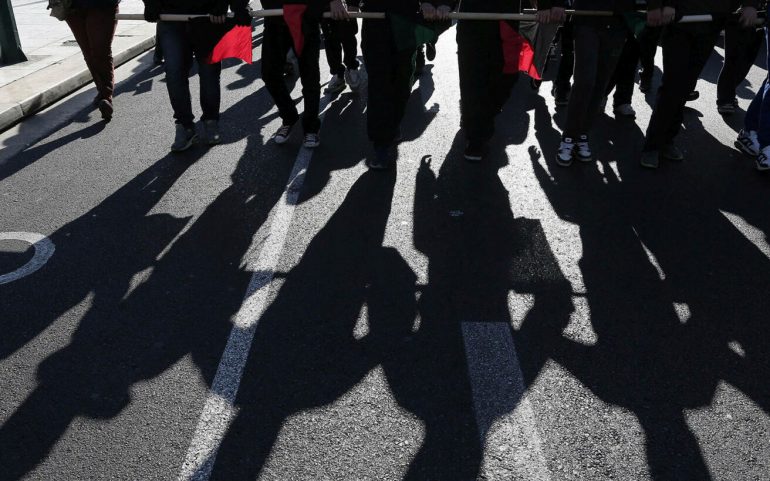"As the number of laws, "The illegal ones are multiplying", said the Chinese philosopher of the 6th century BC. Lao Tzu. The legal arsenal of a state has so many laws that most of them are never enforced either because they are inherently unenforceable or precisely because if they were enforced there would be too many… illegal ones. The citizens, that is, who would actually stand in front of them.
This is the big issue that has arisen with her recent government legislative initiative on public gatherings. With a "hot" autumn ahead of us, many are wondering if the government will be able to enforce such a law.
In other words, what will the police authorities do when (in practice, now, and not in words where everything is easy) a certain category of citizens wants to demonstrate without complying with the provisions of this law? We will have now concentrations and marches that will be confrontational before they even begin?
Violence brings violence and a social explosion, it is the only thing the government does not want Mitsotaki but any government.
The issue of demonstrations is an extremely sensitive issue, especially in countries like Greece, which evokes memories that few want to bring back to public debate.
Perhaps for this reason, all the efforts that have been made by previous governments to (say it politely) regulate the way in which rallies are conducted, have remained in the… stage of the effort.
The most interesting of these cases, bears the signature of the former Speaker of Parliament and then Minister of Public Order, Byron Polydora.
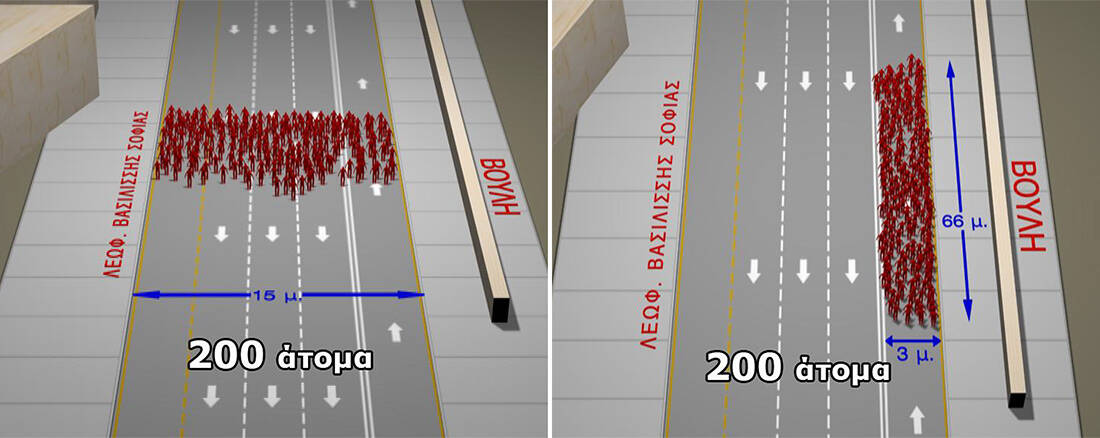

On August 16, 2006, while the parliament is closed, Byron Polydoras publishes a letter inviting all parties involved (parties, municipality of Athens, EVEA, SEV, GSEE and ADEDY) to sit at the dialogue table and find a common solution. The proposal of the then minister was "small demonstrations and marches to take place in a traffic lane, without closing the whole road and without stopping the traffic".
With a clear intention to give a humorous mood, the next day, the press of the time (and especially the opposition newspapers) talk about demonstrations with a measuring tape since the plan of the then Minister of Public Order foresaw that marches of less than 500 protesters would occupy a specific - and proportional to the number of participants - space on the road.
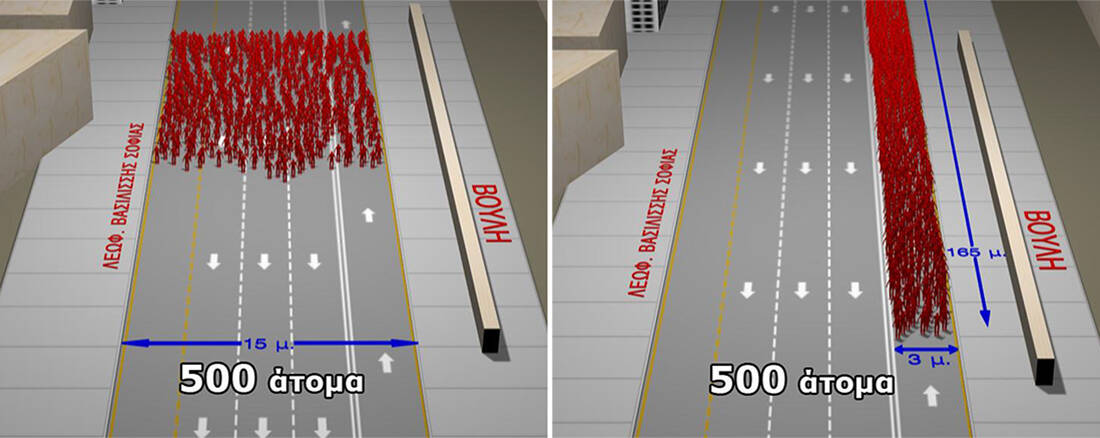

Finally, the meeting takes place on November 27, where V. Polydoras, in the presence of senior officers of the Greek Police, presents his completed plan and shows in graphs what the course of the future will be like. PASOK, KKE, Synaspismos and GSEE are absent from the meeting, reacting strongly to the plan of the Ministry of Public Order.
View here are the graphics presented by the then Minister of Public Order.
According to the "meeting memorandum", as it had been called, the Municipal Authority and the Greek Police in contact with the organizers will agree and agree in a timely manner on all the procedures of the event such as the probable number of participants, the route to be followed. the march-protest and its self-restraint in a traffic lane, so that the city is not paralyzed ". According to this text, "the Traffic Services will be responsible for ensuring with the appropriate means for the observance of the agreement".
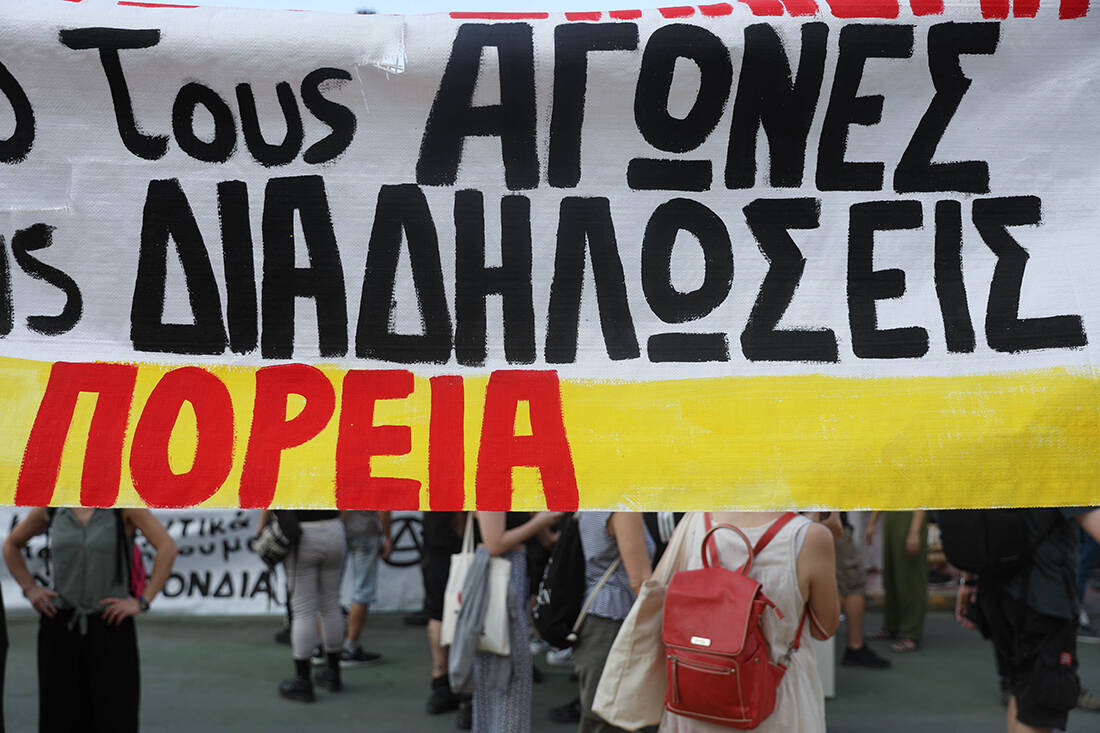
The crucial day, what we would call the crash test, came very quickly as shortly after the signing of this pact, anarchists gathered to march to the center. It was a, not large in volume, and certainly within the limits of Polydora, demonstration carried out by individuals and collectives of the anarchist and anti-authoritarian space, against the strong police presence in Exarchia.
The procession would start from Kanigos square, would cross Akadimias, would pass through Charilaou Trikoupi, would go out to Alexandras and through Patision street would end in Exarcheion square.
Everyone was waiting for the chief police officer to approach the gathered anarchists to tell them that they should walk in a traffic lane. There was a pervasive feeling that the anarchists… expected the same.
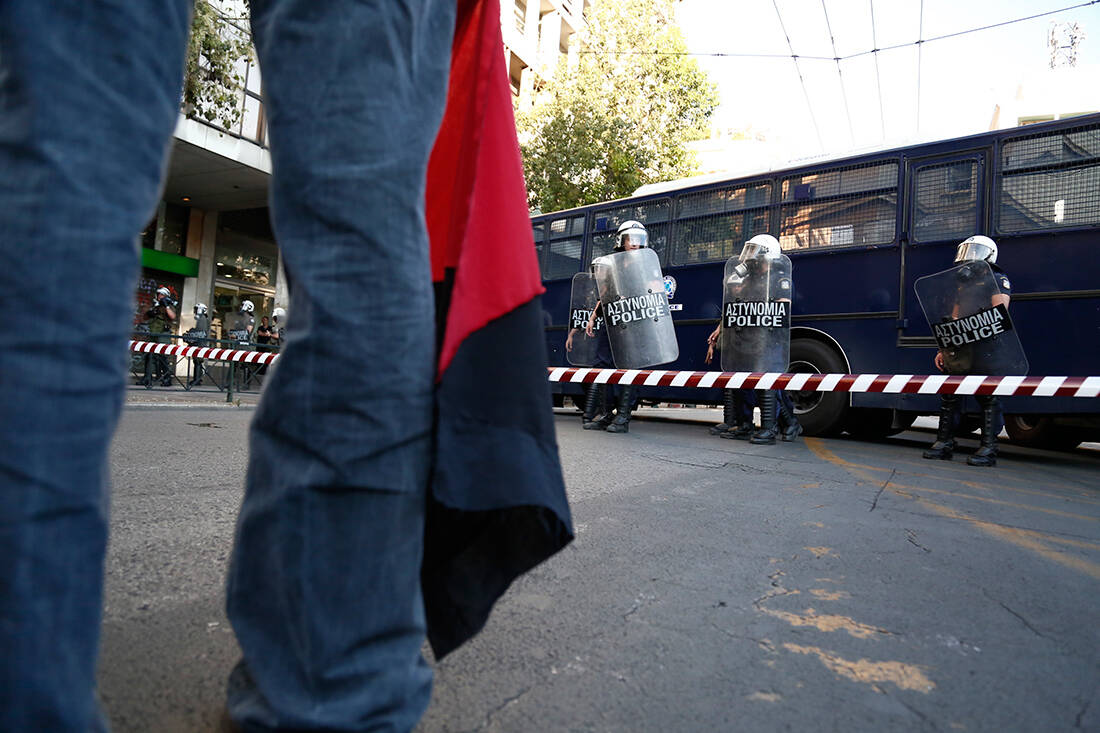
Photographers had the cameras ready and cameramen were preparing the right shot. As time went on, the diffuse tension increased, mainly on the part of the police, who had the burden to negotiate. The time passed and the moment when the march would begin was enough. The puzzled looks continued. And finally the course began. And she made her journey. Normally. As was the case until then. This course was the first practical challenge to the government's plan and a "sign" that this effort is not going to succeed!
The truth is that in a few cases the design was implemented. Until December 2008 came and what was tragic then. Obviously we are not talking about the majestic and massive protests against the murder of the 15-year-old Alexis Grigoropoulos but for the many (too many) smaller ones that took place in almost every neighborhood of Athens and of course in the center of the capital. The police, especially in the first days, kept a tolerant attitude with the obvious aim of easing the tension, mainly of the young people, and so any plans went for a walk.
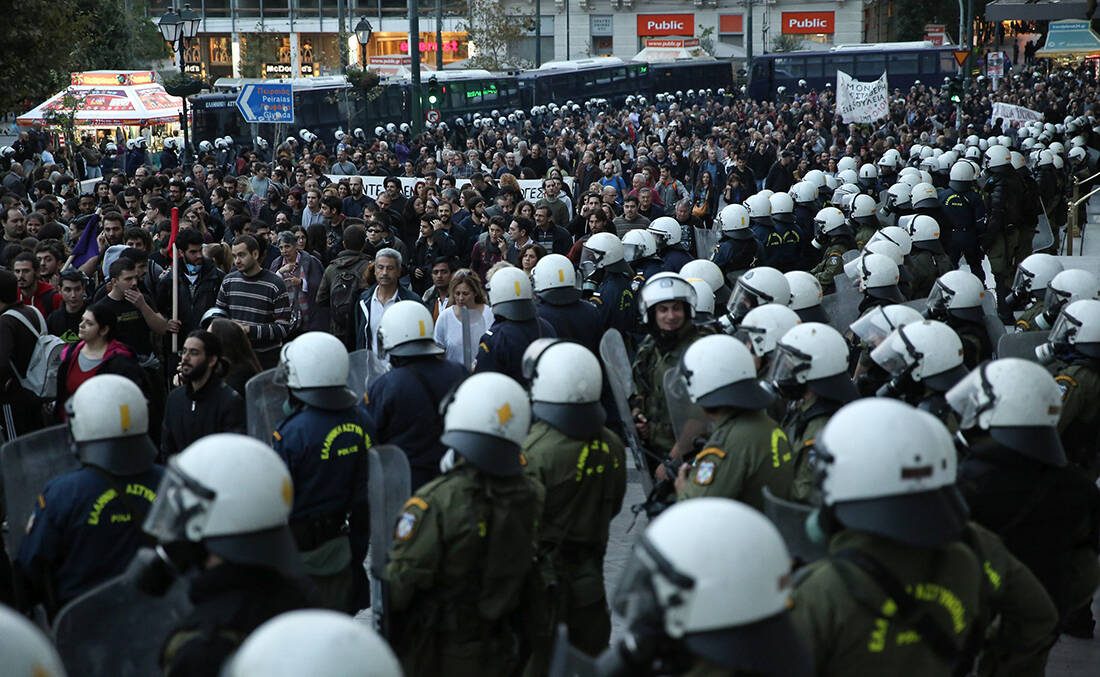
Essentially, this was the first and last serious attempt to put restrictions on how the demonstrations would take place.
It is worth noting, however, that relevant efforts were made in 2001 and 2013. The first time was in 2001 under a ministry (again, as today) Michalis Chrysochoidis but the bill prepared by the Ministry of Public Order never reached parliament.
The last attempt that also did not succeed was in 2013, when the leadership of the Mansion on Katehakis Avenue was Nikos Dendias. The legislation provided for restrictions on demonstrations of less than 200 participants in cities with a population of more than 100.000 and would apply throughout the year and not just during the tourist season, as originally considered. And this initiative, however, had the fate of the previous two.
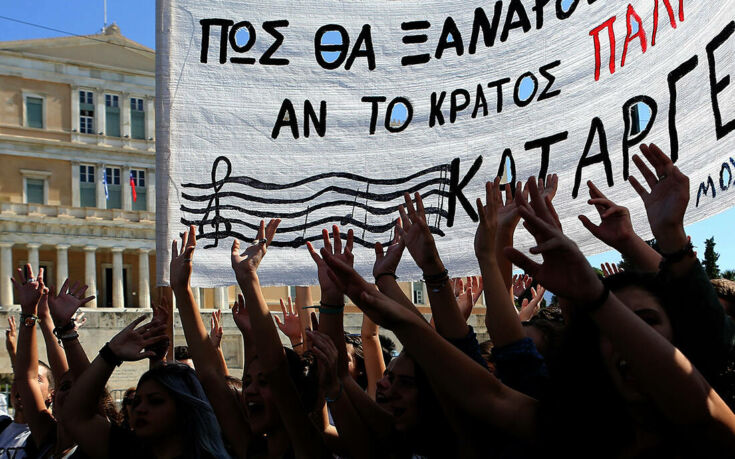
With his always torrent of speech, the then Minister of Public Order and former Speaker of Parliament, spoke to newsbeast.gr for that period and made his assessments of the current situation.
-K. Polydora, I remember that your effort had started the next day from the XNUMXth of August. With people still on vacation. And you were blamed for that.
With my attitude I wanted to anticipate the need, proposing a solution. To prevent the punishment of non-circulation that awaited the Athenians upon their return. The need is for traffic. And the solution is the dialogue of those involved and participants in a process.
We did not do anything on foot. I had by my side worthy police officers at that time, such as Panagiotis Stathis, then a spokesman for the Headquarters, who had taken over the entire technical part, but also the later chief Nikos Papagiannopoulos. We had made diagrams and a whole folder. Dialogue file with parties, trade unions, institutions and the Municipality of Athens.
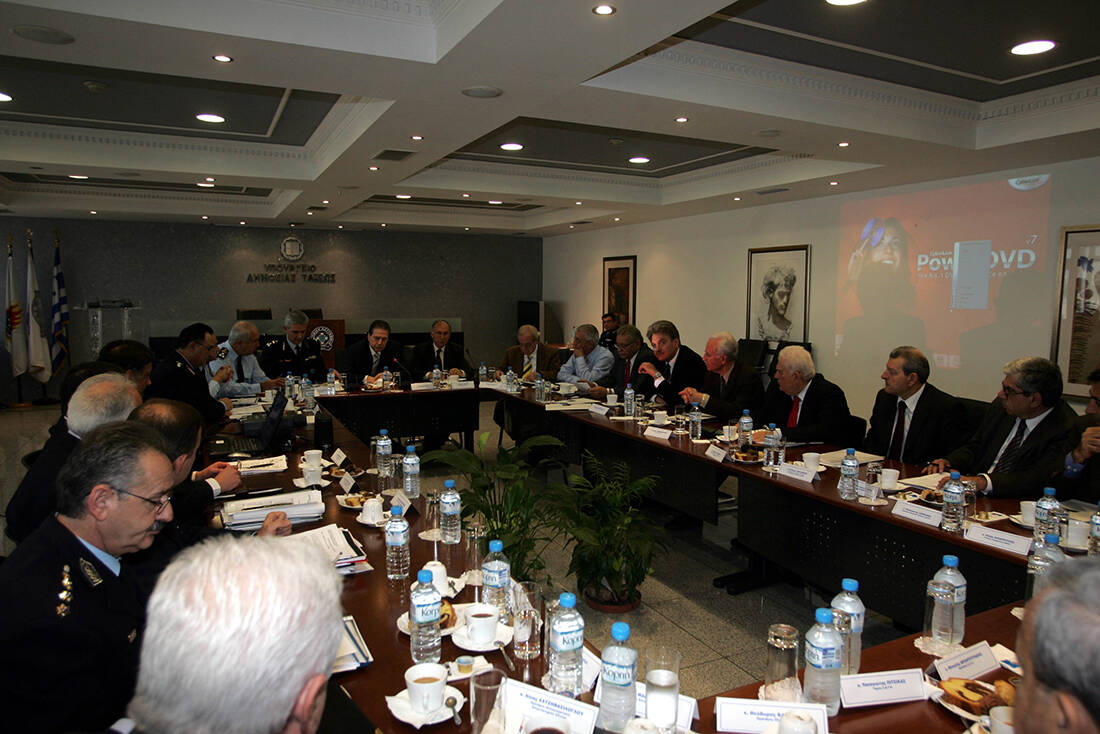

- Despite the preparation you had made, however, in practice it seemed that all this did not work. Why is this considered to have happened?
Because there is the commercialization of the demonstrations. Their tooling. The trade unionists were telling me at the time that "we must also push a little so that our demands are heard"! But the pressure must be on employers and not on citizens.
The whole effort was lost on the way. There was no willingness to cooperate. There was great caution.
- Is it your fault that you tried to make an agreement and not to do it with a Law as it is done now?
No! I did not want to make a Law. The Constitution is the Law. I wanted to make a deal. Sidewalks - traffic lanes - police permit. By administrative acts. Not with Laws. A responsible police could do it now. I have no right to ban demonstrations. I have an obligation, however, to supervise it. I do not say that. It says it Constitution. Article 11 of the Constitution. The right to assemble. «1. Greeks have the right to assemble peacefully and without weapons. 2. The police may be present only at public outdoor gatherings. "Outdoor gatherings can be prohibited by a reasoned decision of the police authority, in general, if they pose a serious threat to public safety, and in some areas, if a serious disruption of socio-economic life is threatened, as required by law."
You see, then, that the spirit of the Constitution is to insure. Not to forbid. They use my argument today. My own plan even provided for the role of the organizer of the march…
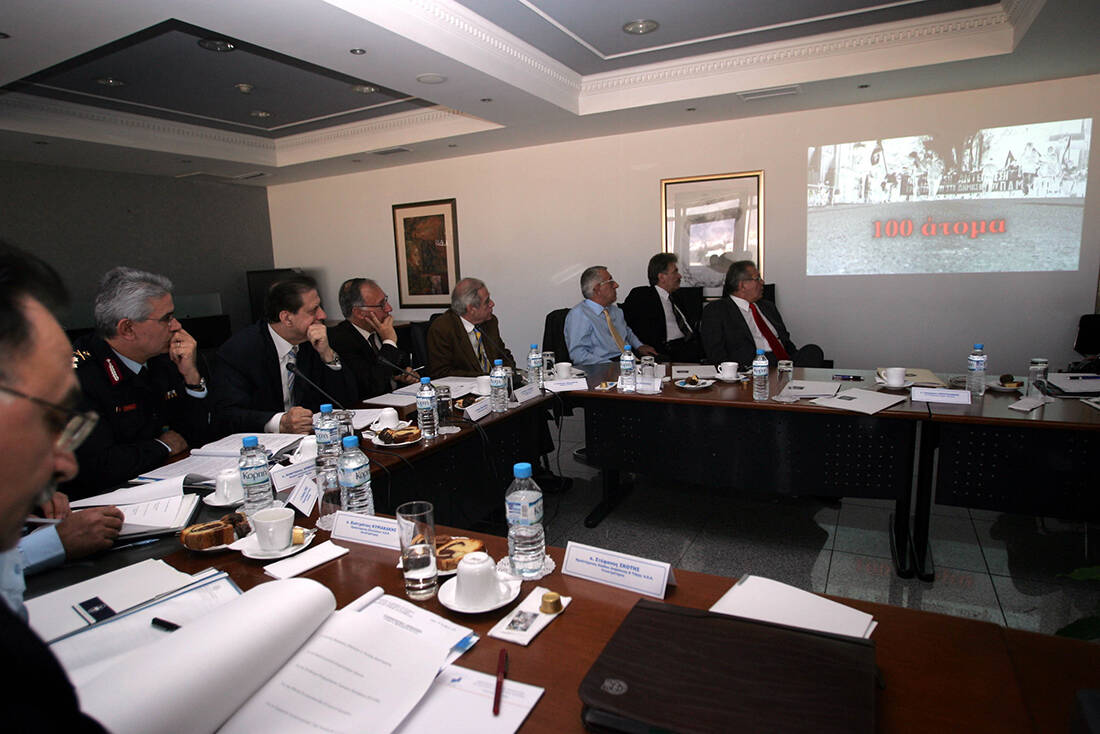

- He foresaw everything but in practice, it was not implemented. Do you remember, I imagine, that march of people from the Anarchist space in Kaningos?
Yes, I remember her. The legend of the Exarchates was created by Greek police. I did not ask anyone to go and be killed. But I asked them to go and do their duty.
-So, to imagine that it is considered that this effort that is being made now will not have any result?
They will repel it from the cluster. Obviously I am not a fortune teller. I acted with care to keep the traffic undisturbed and to have free expression of trade unionists. I did not want to do something that would be based on social automation. Social automation is divisive. I wanted to have a public order. The Penal Code is full of inactive articles. The Constitution stipulates that you make a Law when you want to forbid something. I did not want to forbid anything.
